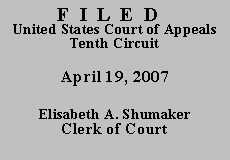 UNITED STATES COURT OF APPEALS
UNITED STATES COURT OF APPEALS
 UNITED STATES COURT OF APPEALS
UNITED STATES COURT OF APPEALS
| DENNIS BROWN, | |
| Petitioner-Appellant, | |
| v. | |
| DAVID R. McKUNE; ATTORNEY GENERAL OF KANSAS, | |
| Respondents-Appellees. |
To obtain a COA, Petitioner must make a "substantial showing of the denial of a constitutional right." 28 U.S.C. § 2253(c)(2). In order to meet this burden, Petitioner must demonstrate "that reasonable jurists could debate whether (or, for that matter, agree that) the petition should have been resolved in a different manner or that the issues presented were adequate to deserve encouragement to proceed further." Slack v. McDaniel, 529 U.S. 473, 484 (2000) (quotation omitted).
Petitioner argues that his trial counsel provided ineffective assistance by failing to raise the issue of marital privilege in order to prevent the use of testimony from Petitioner's alleged common-law wife. Petitioner first raised this issue in a state collateral attack on his conviction. After reviewing portions of the trial transcript and hearing testimony from Petitioner, his mother, his alleged common-law wife, and his trial counsel, the state district court determined that trial counsel could not have succeeded in invoking the marital privilege because the evidence did not show the existence of a common-law marriage at the time of trial. This decision was affirmed by the state appellate court. Because "it is not the province of a federal habeas court to reexamine state-court determinations on state-law questions," Estelle v. McGuire, 502 U.S. 62, 67-68 (1991), we will not reconsider the state courts' determination that there was no common-law marriage at the time of trial. Accordingly, we agree with the district court that it would have been futile for counsel to argue that the marital privilege applied and, as a result, that counsel was not ineffective for failing to raise this issue. See Strickland v. Washington, 466 U.S. 668, 687 (1984).
We have carefully reviewed Petitioner's brief, the district court's disposition, and the record on appeal. Nothing in the facts, the record on appeal, or Petitioner's filing raises an issue which meets our standard for the grant of a COA. For substantially the reasons set forth by the district court, we DENY Petitioner's request for a COA and DISMISS the appeal. We do, however, GRANT Petitioner's motion for leave to proceed on appeal in forma pauperis.
Entered for the Court
Monroe G. McKay Circuit Judge
*. This order is not binding precedent, except under the doctrines of law of the case, res judicata, and collateral estoppel. It may be cited, however, for its persuasive value consistent with Fed. R. App. P. 32.1 and 10th Cir. R. 32.1.